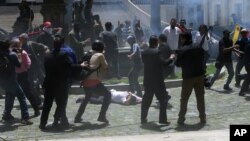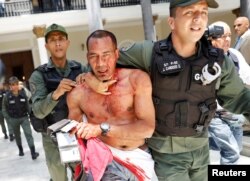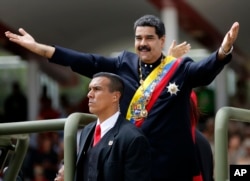Armed supporters of Venezuelan President Nicolas Maduro stormed the country's opposition-held legislature on Wednesday, attacking lawmakers and holding hundreds of people hostage inside the building for nine hours.
At least 12 people were injured, including five legislators and workers at the National Assembly.
National Assembly President Julio Borges blamed Maduro for the situation in Venezuela, where months of political and economic crisis have brought street protests that often turn into violence between pro- and anti-government marchers. Nearly 100 people have been killed.
"The violence in Venezuela is named Nicolas Maduro," Borges told reporters.
The Maduro supporters, who call themselves "colectivos," burst into the legislative chamber at the beginning of the takeover. Shots were fired and detonations were heard, and ambulances took away about 15 injured people, some of them lawmakers with blood streaming down their faces and soaking their shirts.
The armed gangs left the Legislative Palace later, but kept the building surrounded. National Guardsmen patrolled the area but made no move to remove the gunmen or free those being detained inside.
The hostages, including VOA's Alvaro Algarra, could hear gunmen outside the National Assembly building chanting, "It's going to fall. ... This assembly is going to fall."
The National Assembly was meeting in a special session to honor Venezuela's Independence Day when the dozens of colectivos charged into the chamber. That set off a huge brawl in which at least 15 people were injured.
The colectivos have in the past insisted the entire National Assembly must resign, but they announced no demands on Wednesday, Algarra reported.
Assembly President Julio Borges told VOA the lawmakers would not yield to any demands by the gunmen.
President Maduro, marching in a Venezuelan Independence Day parade, said he had nothing to do with what he called the “strange events” at the National Assembly.
“I do not accept violence from anyone,” Maduro said, adding that he would call for an investigation.
A country in crisis
Venezuela has been gripped by a political and economic crisis for months. Daily street protests against the Maduro government often explode into violence between pro- and anti-government marchers. Nearly 100 people have been killed.
Maduro has called an election on July 30 for members of a special assembly to rewrite Venezuela's constitution — the only way, the president said, to fix the country's problems and end violence.
Opposition leaders proposed instead an unofficial referendum, which they said would give Venezuela's people a voice, to choose whether they want a new national charter. Maduro's call for a new constitution is a ruse, the opposition said, intended to tighten his grip on the country and move toward dictatorship.
Venezuela's economic collapse, caused by both plunging world energy prices and government corruption, has wreaked havoc on what was once a prosperous, oil-rich nation. Basic staples such as flour, bread, cooking oil and gasoline are in extremely short supply. Many Venezuelans routinely cross the borders into neighboring Colombia and Brazil to buy food.
Maduro blames his country's woes on the United States and warns of civil war if the Organization of American States intervenes.
Alvaro Algarra in Caracas contributed to this report


